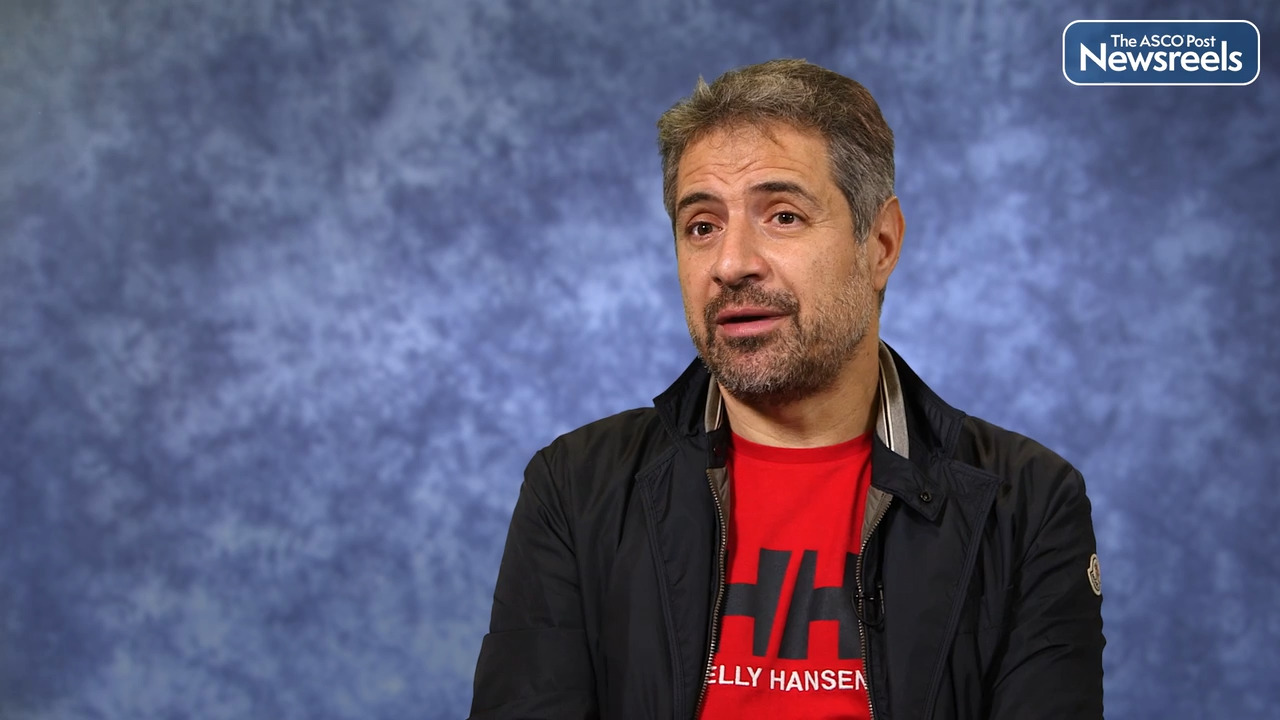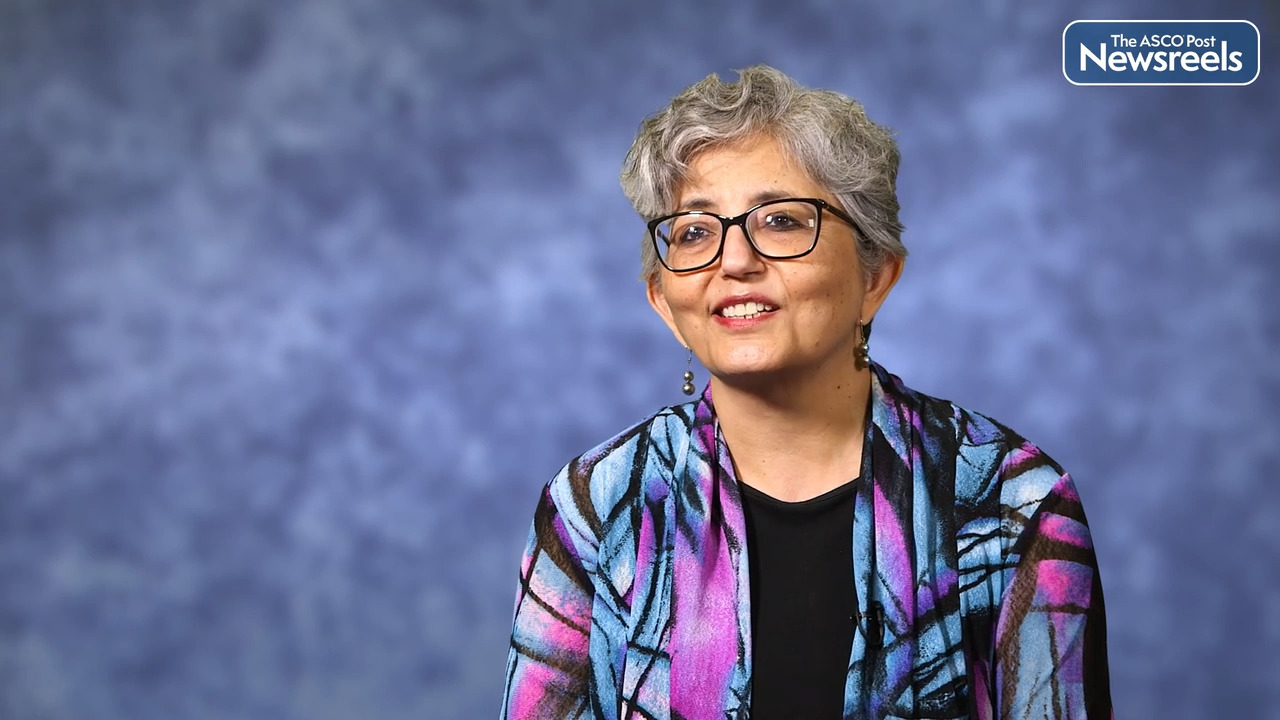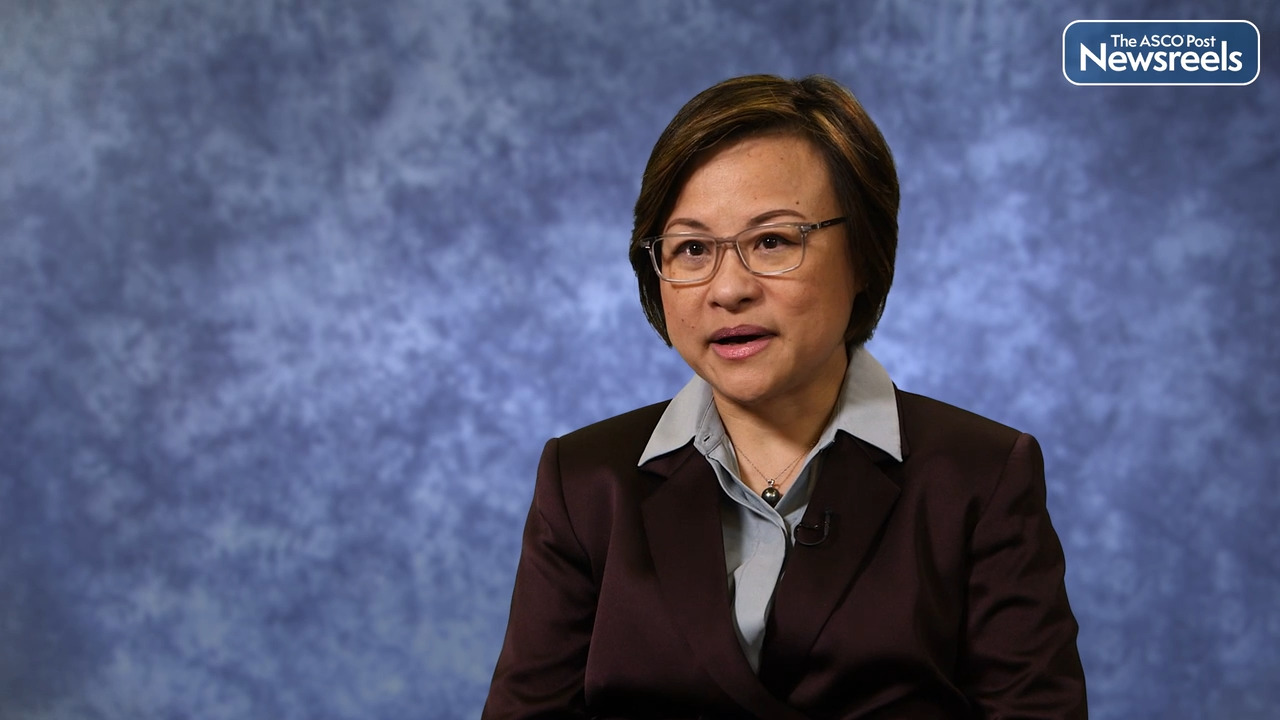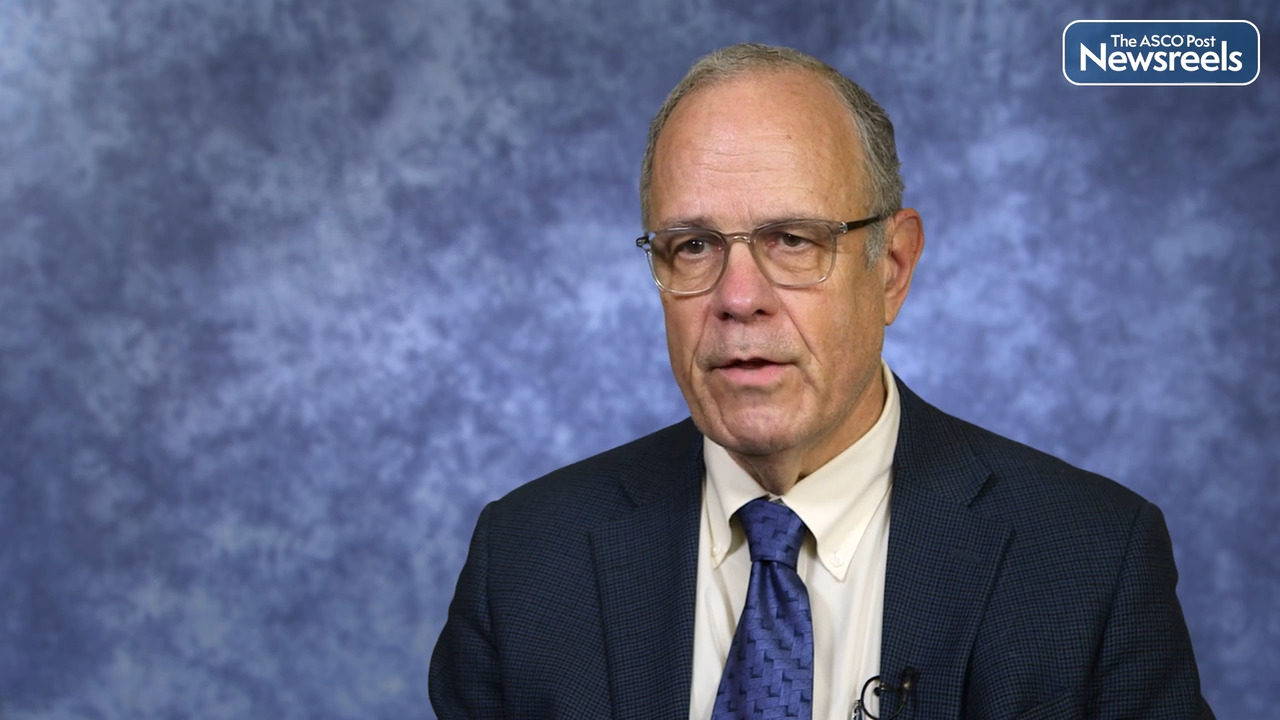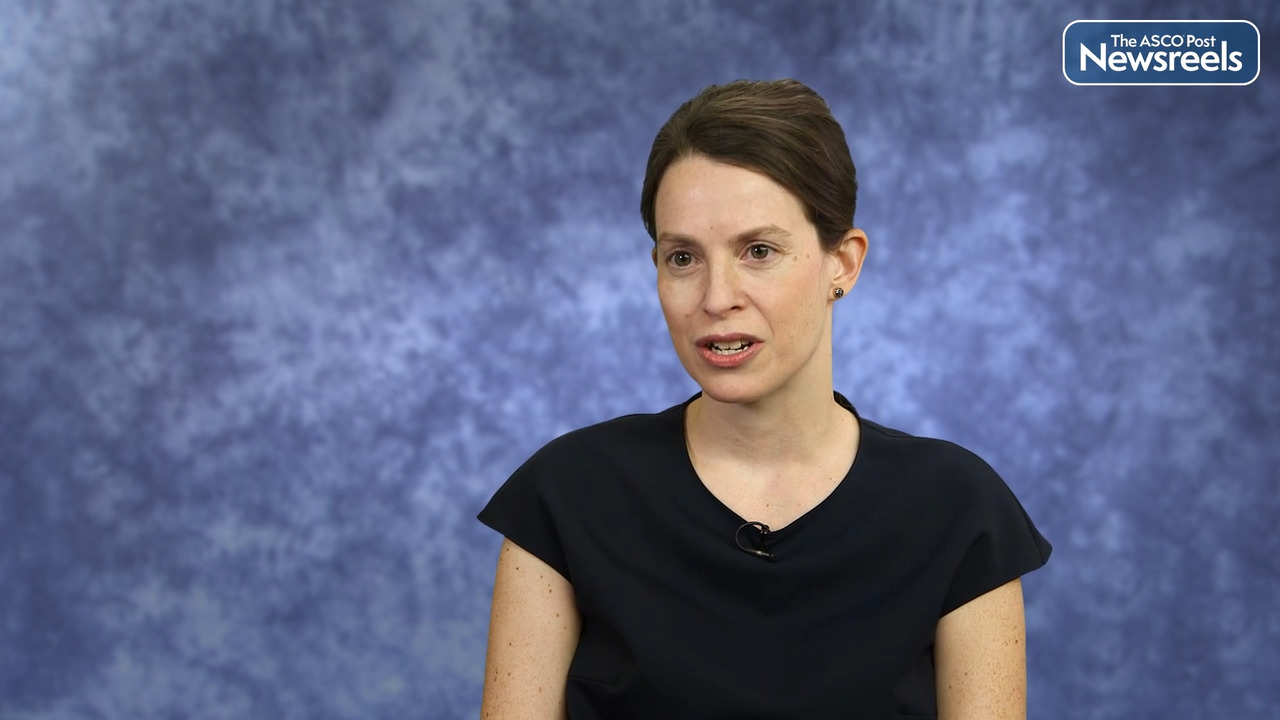Stephen M. Ansell, MD, PhD, and Patrizia Mondello, MD, PhD: New Findings on How the IRF4 Gene Shapes Tumor Immunity in Follicular Lymphoma
2022 ASH Annual Meeting and Exposition
Stephen M. Ansell, MD, PhD, and Patrizia Mondello, MD, PhD, both of the Mayo Clinic, discuss the 20% of patients with follicular lymphoma (FL) who relapse early and experience a poor prognosis. The researchers found that FLs with high levels of IRF4 expression are associated with a suppressive tumor microenvironment, and selective IRF4 silencing restores antilymphoma T-cell immunity. Further investigation is warranted to identify the mechanisms by which IRF4 controls tumor immunity to develop precision therapies for this population (Abstract 70).
Transcript
Disclaimer: This video transcript has not been proofread or edited and may contain errors.
Stephen M.Ansell:
Dr. Mondella, that was a great abstract, really appreciated what you had to say about IRF4 in follicular lymphoma. I was really interested and curious: why did you pick IRF4? What do we know about it, and why would that be important in follicular lymphoma?
Patrizia Mondella:
That is a fantastic question. The point here is we perform a [inaudible 00:00:27] studies that identify the A cluster with particular relevance of R four and poor prognosis and two microenvironment. The problem is there is not so much known about R four as interact with the tumor micro environment and we wanted to understand how it's possible that the B cells may reprogram the tumor micro environment. So for this reason, we assessed whether the R Four expression could be associated with the batter or a worse tumor micro environment. And we further dissect with the different bioinformatics analysis to evaluate first of all, which are the mono population more frequently associated with R four high or low expression. And we indeed define how I R four expression was associated with higher deregulatory cells, higher CD 40 cells and we also further identify the immuno phenotype that was exhausted and we then try to do some in vitro experiment and identify that if we have or we don't have R four, we can modulate costimulatory receptor of the B cells that then can be one of the counterpart that can influence the tumor microenvironment. But also the cytokines that are released from cells, they may or may not expressor report they can further influence the tumor microenvironment.
Stephen M.Ansell:
And you showed some really interesting information about certain receptor ligand pairs that change and that go up and down based on IRF4. Tell me a little bit more about exactly what you showed.
Patrizia Mondella:
Yeah, see what I was referring about costimulatory receptors is more fertilizer to the CD 40 expression that engage the IRF4 haler cells and the PDL one expression. So while left CD 40 was down regulated in R four high, the PDL one was up regulated and PDL one is more inhibitory. So we identify how R four is controlling the expression of this receptors and the indeed that can influence the tumor macro environment.
Stephen M.Ansell:
And this actually impacts not all of follicular lymphoma but a subset. So about how many, what percentage of follicular lymphoma is this a relevant mechanism?
Patrizia Mondella:
So as now we have identified something about a 20 or something more percent of the tumor analyze the problem is that we need to further expand our investigation in order to make a better statement. And the more interesting finding is that what we have identified at the bioinformatics level was also translated in [inaudible 00:03:16] chemistry level. And this isn't interesting because our IRF4 is currently not assessed in the normal panel that is used for follicular lymphoma. And we believe this should be actually add in order to evaluate the prognosis of the patients. But again, we have fundings that were done in a small subset and currently as you know, we are going to expand further these identification in order to make a better statement.
Stephen M.Ansell:
And clearly this is an important finding because it's an opportunity to modulate something, to change something that could in a bad prognosis group result in a better outcome. So how do you think we might be able to target, are we going to go after IRF4?, are we going to go off to CD 40? Or We going to go off to PD-l? What do you think?
Patrizia Mondella:
This is an excellent question. So first of all, one of the most important part is that IRF4 is not only expressing focal lymphoma, but we have to remember that is expressed in many other [inaudible 00:04:14] lymphoma. We need to think about that IR F4 is a prognostic also in aggressive B-cell lymphoma. I believe that there is a room for target therapy against IRF4 and we really need to better understand how to target IRF4 since it's a transcription factor. So probably a product drug might be the way to go. But it's also interesting because our four reactive antigen presentation, so it might be using combination with other immunotherapy components or can be also used to in combination with CART-cell therapy. So probably this is an exciting field that should be further expanded.
Stephen M.Ansell:
Yeah, really exciting field. So thank you. That's exceedingly interesting and again, I look forward to where this goes with the next iteration and maybe targeted therapies in the future.
Patrizia Mondella:
Thanks so much.
Stephen M.Ansell:
Thank you.
The ASCO Post Staff
Elias Jabbour, MD, of The University of Texas MD Anderson Cancer Center, discusses an analysis confirming that olverembatinib is a potentially viable treatment option for patients with chronic myeloid leukemia (CML) and Philadelphia chromosome–positive acute lymphoblastic leukemia (ALL), including those with CML whose disease did not respond to ponatinib or asciminib, or who had a T315I mutation (Abstract 82).
The ASCO Post Staff
Smita Bhatia, MD, MPH, of the Institute for Cancer Outcomes and Survivorship, University of Alabama at Birmingham, discusses study findings that showed key somatic mutations in the peripheral blood stem cell product increases the risk of developing therapy-related myeloid neoplasms (Abstract 119).
The ASCO Post Staff
Jia Ruan, MD, PhD, of Meyer Cancer Center, Weill Cornell Medicine, and NewYork-Presbyterian Hospital, discusses trial results demonstrating that the triple chemotherapy-free combination of acalabrutinib, lenalidomide, and rituximab is well tolerated, highly effective, and produces high rates of minimal residual disease (MRD)-negative complete response as an initial treatment for patients with mantle cell lymphoma, including those with TP53 mutations. Real-time MRD analysis may enable treatment de-escalation during maintenance to minimize toxicity, which warrants further evaluation. An expansion cohort of acalabrutinib/lenalidomide/obinutuzumab is being launched (Abstract 73).
The ASCO Post Staff
Mark R. Litzow, MD, of the Mayo Clinic, discusses phase III results from the ECOG-ACRIN E1910 Trial, which show that adding blinatumomab to consolidation chemotherapy resulted in a significantly better overall survival in adult patients aged 30 to 70 years with newly diagnosed B-lineage acute lymphocytic leukemia (ALL) who were measurable residual disease–negative after receiving intensification chemotherapy. The authors believe this may represent a new standard of care for this population (Abstract LBA-1).
The ASCO Post Staff
Julie Côté, MD, of CHU de Québec–Université Laval, discusses findings from the Canadian Myeloma Research Group database, which showed that integrating bortezomib and lenalidomide into the autologous stem cell transplant (ASCT) sequence produces a median overall survival rate ≥ 10 years in most patients with newly diagnosed multiple myeloma. These observations highlight the contribution of post-ASCT maintenance, particularly lenalidomide given until disease progression, when used in multiple patient groups including those with and without high risk, as well as those requiring a second induction regimen (Abstract 117).
